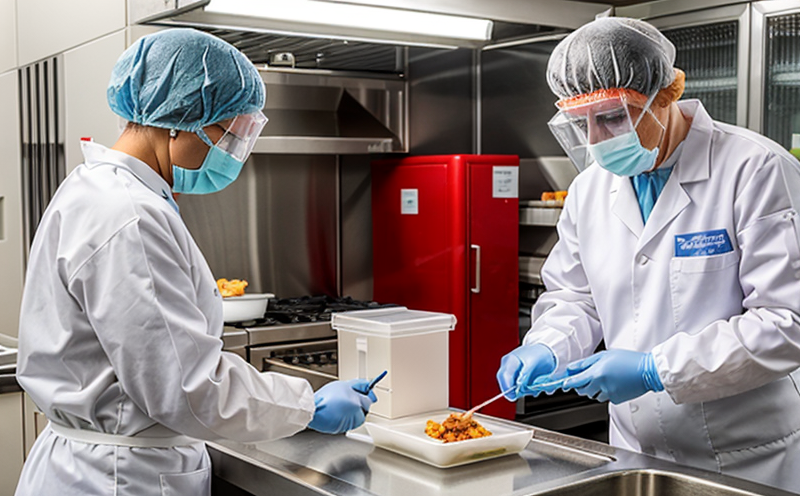EN 17888 Detection of Sapovirus in Fresh Vegetables
The European Standard EN 17888 provides a comprehensive protocol for the detection and quantification of Sapovirus, a genus of viruses that can cause acute gastroenteritis, particularly through contaminated food products. The standard is widely used by quality managers and compliance officers to ensure fresh vegetables are free from viral contamination. This service focuses on the specific application of EN 17888 in the context of food safety testing.
The protocol outlined in EN 17888 emphasizes the importance of early detection, as sapoviruses can survive for prolonged periods under favorable conditions and may be transmitted through various food handling practices. The standard highlights the role of quality assurance in maintaining public health by ensuring that fresh vegetables meet stringent safety standards.
The methodology involves several critical steps to ensure accurate and reliable results. Initially, samples are collected from fresh vegetables according to predefined protocols. These samples are then subjected to rigorous laboratory procedures for virus isolation and detection. The standard specifies the use of advanced molecular techniques such as reverse transcription polymerase chain reaction (RT-PCR) for sensitive detection.
The process ensures that any sapovirus present in the sample is accurately quantified, allowing for effective monitoring and control measures. This approach not only helps in maintaining product integrity but also supports compliance with international food safety standards like ISO 22000 and HACCP (Hazard Analysis and Critical Control Points).
Furthermore, the standard provides guidelines on specimen preparation, which is crucial to ensure accurate results. Proper handling of samples before analysis can significantly impact the reliability of test outcomes. This includes steps such as preservation, transport, and storage under controlled conditions.
The methodology also emphasizes the importance of validating detection methods against known reference strains. This ensures that the testing procedure remains robust and reliable over time. The standard recommends regular calibration of equipment to maintain precision and accuracy in results.
In summary, EN 17888 is a vital tool for food safety professionals aiming to protect public health by ensuring fresh vegetables are free from sapovirus contamination. Its rigorous protocols provide the necessary framework for accurate detection and quantification, supporting compliance with international standards and contributing to overall food safety.
Scope and Methodology
The scope of EN 17888 encompasses the complete process from sample collection to final result reporting. It provides a detailed procedure for detecting sapoviruses in fresh vegetables, emphasizing the importance of early detection and accurate quantification.
- Sample Collection: Samples are collected from various parts of fresh vegetables according to predefined protocols.
- Virus Isolation: The standard outlines specific techniques for isolating sapoviruses from samples.
- Molecular Detection: Advanced molecular methods, such as RT-PCR, are used for sensitive detection and quantification.
The methodology also includes guidelines on specimen preparation, which involves steps like preservation, transport, and storage under controlled conditions. Proper handling of samples before analysis is crucial to ensure accurate results. Regular calibration of equipment ensures the precision and accuracy of test outcomes.
Validation against known reference strains further enhances the reliability of detection methods over time. This approach not only supports compliance with international standards but also contributes to maintaining product integrity and public health.
Detailed Methodology
The detailed methodology for detecting sapoviruses in fresh vegetables as per EN 17888 involves several critical steps. Initially, samples are collected from various parts of the vegetables according to predefined protocols. These samples undergo rigorous laboratory procedures for virus isolation and detection.
- Sample Collection: Samples are collected using sterile techniques to avoid contamination.
- Virus Isolation: The standard specifies the use of advanced molecular techniques such as RT-PCR for sensitive detection. This method involves extracting nucleic acids from the samples and amplifying them in a controlled environment.
- Molecular Detection: The amplified nucleic acids are then analyzed to detect the presence of sapoviruses. This process ensures accurate quantification of any viruses present.
The methodology also includes guidelines on specimen preparation, which involves steps like preservation, transport, and storage under controlled conditions. Proper handling of samples before analysis is crucial to ensure accurate results. Regular calibration of equipment ensures the precision and accuracy of test outcomes.
Validation against known reference strains further enhances the reliability of detection methods over time. This approach not only supports compliance with international standards but also contributes to maintaining product integrity and public health.
Eurolab Advantages
Our laboratory, Eurolab, offers unparalleled expertise in food safety testing, particularly for sapovirus detection. With state-of-the-art facilities and experienced scientists, we provide comprehensive services that meet the highest standards.
- Expertise: Our team of professionals has extensive experience in foodborne pathogen detection.
- Technology: We utilize advanced molecular techniques like RT-PCR for sensitive and accurate results.
- Compliance: Our services align with international standards such as ISO 22000 and HACCP.
We offer rapid turnaround times, ensuring timely delivery of test results. Our commitment to accuracy and reliability is reflected in our consistent compliance with EN 17888 and other relevant standards.
Competitive Advantage and Market Impact
- Precision: Utilizing advanced molecular techniques ensures highly precise results, setting us apart from competitors.
- Speed: Our rapid turnaround times allow for timely decision-making in food safety.
Our services not only enhance the reputation of our clients by ensuring product integrity but also contribute to public health by preventing the spread of sapoviruses. By adhering strictly to EN 17888, we help maintain compliance with international standards and support sustainable business practices.





